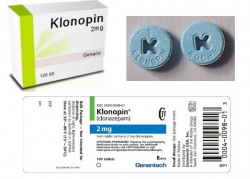Klonopin (clonazepam) Coupons, Discounts & Cost
Klonopin (clonazepam) belongs to the class of benzodiazepines. The drug acts on certain brain chemicals that can cause seizures. One way to save money on the Klonopin (clonazepam) retail cost regardless of income and insurance status is to use Klonopin (clonazepam) coupons or discount cards from RXCoupons. Use our Klonopin (clonazepam) coupons at your online pharmacy and receive up to 75% off the sale price each time you refill your prescription.
What do I need to know about Klonopin (clonazepam)?
Klonopin (clonazepam) belongs to the class of benzodiazepines. The drug acts on certain brain chemicals that can cause seizures. Clonazepam is used to treat seizures. The drug may be used for other purposes not listed here.
What should I discuss with my doctor before taking Klonopin (clonazepam)?
Do not take Klonopin (clonazepam) if you have narrow-angle glaucoma. Before taking this medication, tell your doctor if you have kidney disease, liver disease, alcohol or drug addiction, asthma, bronchitis, emphysema or other respiratory disease, depression or suicidal thoughts.
If you suffer from one or more of the conditions listed above, you may require a reduced dose of Klonopin (clonazepam).
Do not take Klonopin (clonazepam) if you are pregnant without first talking to your doctor. This component may have an effect on the fetus. Do not take clonazepam if you are breastfeeding.
The likelihood of side effects of the drug is very high over the age of 60. Your doctor may prescribe a lower dose of clonazepam.
How should I use Klonopin (clonazepam)?
Klonopin (clonazepam) should be used in strict accordance with the doctor's recommendations. Take each tablet of Klonopin with a full glass of water. Do not exceed the prescribed dose. Do not abruptly stop taking the drug: this can lead to convulsions and withdrawal syndrome. Consult your doctor about whether you should stop taking your medication.
Store Klonopin (clonazepam) at room temperature. The drug must be kept away from moisture and heat.
What happens if I overdose?
Contact your doctor immediately if you suspect an overdose.
Overdose symptoms may include drowsiness, dizziness, confusion, slow heartbeat, shortness of breath, difficulty talking and walking symptoms.
Klonopin (clonazepam) precautionary measures
Use caution when driving or performing other hazardous activities. Klonopin (clonazepam) may cause drowsiness and dizziness.
Use caution when drinking alcohol. Alcohol consumption should be moderate, as it may increase drowsiness and dizziness caused by clonazepam. Excessive drinking also increases the chance of having a seizure.
Patients should also avoid other sedatives, sleeping pills and tranquilizers. These drugs should not be taken together with clonazepam without doctor's permission.
What are the possible side effects of Klonopin (clonazepam)?
If you experience any of the following serious side effects, stop taking the drug and consult your doctor: - Allergic reactions (rash, difficulty breathing, narrowing of the airways, swelling of the lips, face, tongue); - Sores in the mouth or throat; - Yellowing of the skin or eyes; - Hallucinations or blurred vision.
Less serious side effects: - Drowsiness, dizziness, clumsiness; - Depression; - Nausea, vomiting, diarrhea or constipation; - Difficulty urinating; - Strange or vivid dreams; - Headache; - Dry mouth; - Decreased sex drive; - Changes in behavior.
There may be other side effects as well. You should tell your doctor if you have any of these symptoms.
Klonopin (clonazepam) interaction with other drugs
Before starting Klonopin (clonazepam) therapy, tell your doctor if you are taking any of the following medications: - Antihistamines, such as brompheniramine, chlorpheniramine, azatadine, clemastine, etc. - Painkillers, such as meperidine, morphine, propoxyphene, oxycodone, fentanyl, codeine, etc. - Other sedatives, such as phenobarbital, pentobarbital, amobarbital, etc. - Antidepressants, such as amitriptyline, doxepin, imipramine, fluoxetine, paroxetine, etc.
Any of the drugs listed above may cause dizziness or drowsiness.
Clonazepam may decrease the efficacy of other anticonvulsants.
Clonazepam may interact with other drugs not listed in this medication guide. You should consult with your doctor if you take several different medicines.

